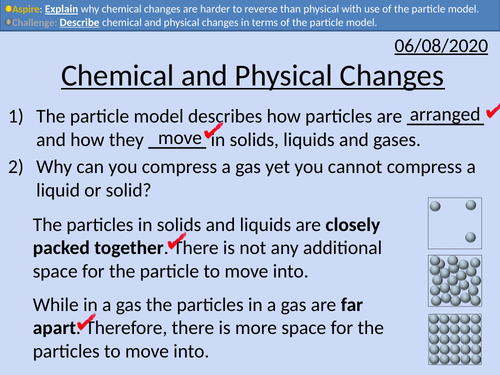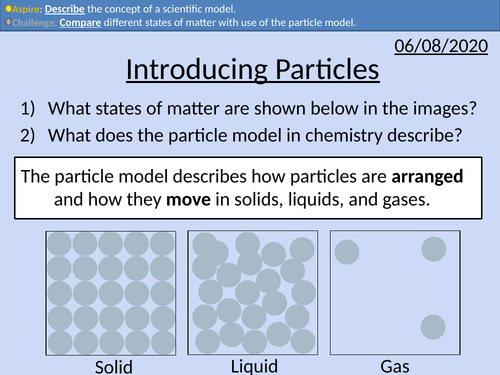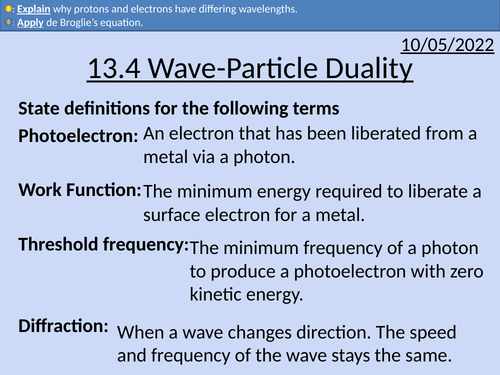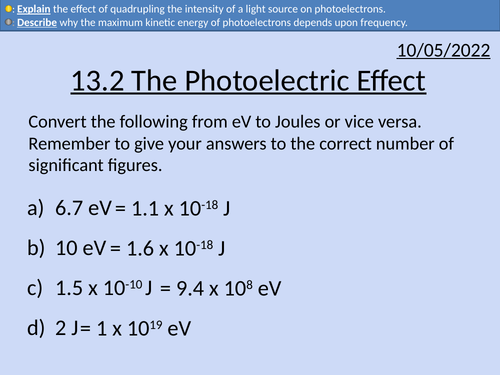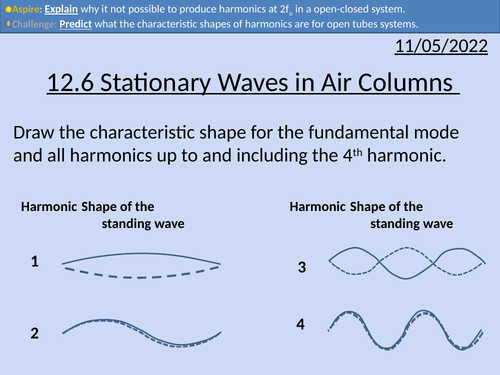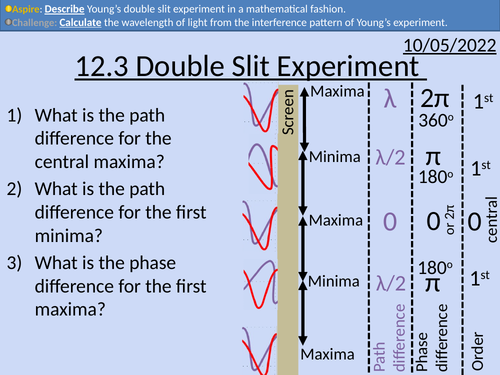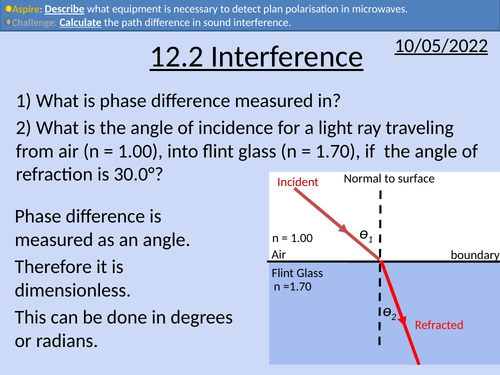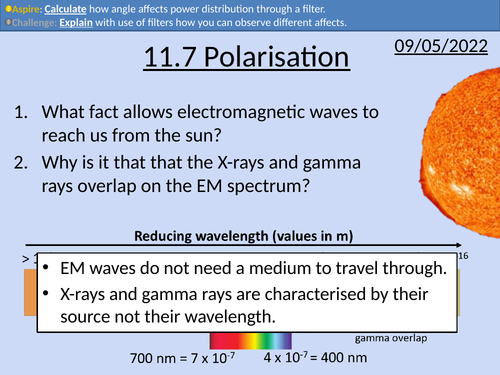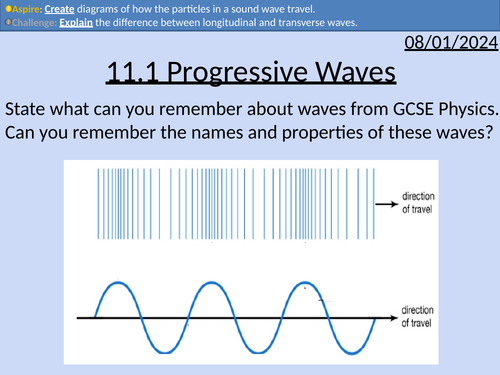496Uploads
163k+Views
70k+Downloads
All resources

GCSE Chemistry: Chemical and Physical Changes
This PowerPoint presentation with worked examples and student questions covers:
• Differences between physical and chemical changes
• Explain why physical changes are generally easier to reverse

GCSE Chemistry: Introducing Particles
This PowerPoint presentation with worked examples and student questions covers:
• Solids, liquids, and gases
• Scientific models as a concept
Bundle

OCR AS level Physics: Quantum Physics
OCR AS level Physics presentations for module 4: Quantum Physics.
All presentations are full lesson PowerPoints with worked examples and homeworks with complete worked answers.
The Photon Model
Energy of a single photon
Converting from electron-volts to Joules.
Frequency of the electromagnetic spectrum
Determining Plank’s constant with LEDs
Threshold potential difference difference
Photoelectric Effect
Threshold frequency
Producing photoelectrons
Kinetic energy of photoelectrons
Linking frequency and wavelength
The electromagnetic spectrum, frequency and energy.
Einstein’s Photoelectric Equation
The photoelectric equation
Work function and Kinetic Energy
Determining work function from a graph
Determining threshold frequency from a from graphical analysis.
Determining Plank’s constant from graphical analysis.
Wave Particle Duality
deBroglie wavelength equation
Diffraction of electrons and protons
Comparing wavelengths of particles with different masses
Kinetic energy and wavelength

OCR AS level Physics: Wave-Particle Duality
OCR AS level Physics: Wave-Particle Duality is a part of the Module 4: Electrons, Waves, and Photons.
Full lesson PowerPoint with worked examples and homework with complete worked answers.
deBroglie wavelength equation
Diffraction of electrons and protons
Comparing wavelengths of particles with different masses
Kinetic energy and wavelength

OCR AS level Physics: Einstein's Photoelectric Equation
OCR AS level Physics: Einstein’s Photoelectric Effect Equation is a part of the Module 4: Electrons, Waves, and Photons.
Full lesson PowerPoint with worked examples and homework with complete worked answers.
The photoelectric equation
Work function and Kinetic Energy
Determining work function from a graph
Determining threshold frequency from a from graphical analysis.
Determining Plank’s constant from graphical analysis.

OCR AS level Physics: The Photoelectric Effect
OCR AS level Physics: The Photoelectric Effect is a part of the Module 4: Electrons, Waves, and Photons.
Full lesson PowerPoint with worked examples and homework with complete worked answers.
Threshold frequency
Producing photoelectrons
Kinetic energy of photoelectrons
Linking frequency and wavelength
The electromagnetic spectrum, frequency and energy.
Bundle

OCR AS level Physics: Waves 2
OCR AS level Physics presentations for module 4: Waves 2
All presentations come with worked examples, solutions and homeworks.
This covers topics from Superposition of Waves to Harmonics with different boundary conditions.

OCR AS level Physics: Stationary Waves in Air Columns
OCR AS level Physics: Stationary Waves in Air Columns is a part of the Module 4: Electrons, Waves, and Photons. PowerPoint with worked examples and homework.

OCR AS level Physics: Harmonics
OCR AS level Physics: Harmonics is a part of the Module 4: Electrons, Waves, and Photons. PowerPoint with worked examples and homework.

OCR AS level Physics: Stationary Waves
OCR AS level Physics: Stationary Waves is a part of the Module 4: Electrons, Waves, and Photons. PowerPoint with worked examples and homework.

OCR AS level Physics: Double Slit Experiment
OCR AS level Physics: Double Slit Experiment is a part of the Module 4: Electrons, Waves, and Photons. PowerPoint with worked examples and homework.

OCR AS level Physics: Interference
OCR AS level Physics: Interference is a part of the Module 4: Electrons, Waves, and Photons. PowerPoint with worked examples and homework.

OCR AS level Physics: Superposition
OCR AS level Physics: Superposition of Waves is a part of the Module 4: Electrons, Waves, and Photons. PowerPoint with worked examples and homework.
Bundle

OCR AS level Physics: Waves 1
OCR AS level Physics presentations for module 4: Waves 1
All presentations come with worked examples, solutions and homeworks.
This covers topics from wave properties to Snell’s law and total internal reflection.

OCR AS level Physics: Polarisation
OCR AS level Physics: Polarisation is a part of the Module 4: Electrons, Waves, and Photons. PowerPoint with worked examples and homework.

OCR AS level Physics: Progressive Waves
OCR AS level Physics: Progressive Waves is a part of the Module 4: Electrons, Waves, and Photons. PowerPoint with worked examples and homework.
Bundle

OCR AS level Physics: Electrical Circuits
OCR AS level Physics presentations for module 4: Energy, Power, and Resistance.
All presentations come with worked examples, solutions and homeworks.
This covers topics from Kirchhoff’s laws to potential dividers and sensing circuits.
Bundle

OCR AS level Physics: Energy, Power, and Resistance
OCR AS level Physics presentations for module 4: Energy, Power, and Resistance.
All presentations come with worked examples, solutions and homeworks.
This covers topics from circuit symbols to paying for electricity.
All circuit symbols required for OCR A level physics
Polarity of cells and batteries
Electron flow and conventional current
Calculating the base SI units for volts
Comparing potential difference and electromotive force (emf).
Circuit diagrams for measuring potential difference and emf.
Calculating energy dissipated in a circuit.
The structure of an electron gun.
The electron gun in the history of science (J.J. Thomson).
Rearranging equations to equate kinetic energy and work done.
Accelerating potential differences
Comparing the protons and electrons accelerated in a potential difference
Definition of an ohm.
Temperature and resistance for metallic conductors (wires)
The ohm in base SI units
I against V graphs and resistance
I-V Characteristics curves for ohmic components
I-V Characteristics curves for non-ohmic components
Circuit diagrams used to measure I and V.
Describing I-V Characteristics curves
Polarity of diodes
Conventional current and diodes
Plotting I-V curves for diodes
Describing I-V curves for diodes
Factors affecting resistance
Calculating resistivity
Resistivity and temperature
Experimentally determining resistivity
Using a graph to calculate resistivity
Thermistor uses
Thermistors with negative temperature coefficients
Plotting I-V curves for thermistors
Creating an experiment to test thermistors.
Materials and uses of LDRs
Creating an experiment to understand LDRs
LDRs relationship with light intensity
Converting time to hours
Using different units for electrical energy
Converting from J to kW hr
Calculating the cost of using different electrical appliances.

OCR AS level Physics: Resistance and Resistivity
OCR AS level Physics: Resistance and Resistivity is a part of the Module 4: Electrons, Waves, and Photons. PowerPoint with worked examples and homework.
Factors affecting resistance
Calculating resistivity
Resistivity and temperature
Experimentally determining resistivity
Using a graph to calculate resistivity
Bundle

OCR AS level Physics: Laws of Motion
OCR AS level Physics presentations for module 3: Materials.
All presentations come with worked examples, solutions and homeworks.
This covers topics from Newton’s laws to conservation of momentum in two dimensions.

